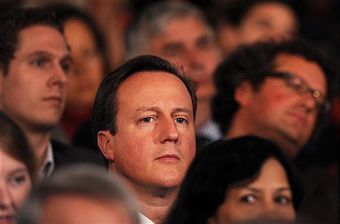 Whether you agree with the plan to restrict child benefit or not – and, broadly
speaking, I do – there’s little doubting that it has met with some fiery resistance in the papers today. The Telegraph leads the attack, calling it “a
hastily conceived about-turn bundled out on breakfast TV”. The Daily Mail highlights the “blatant anomaly,” currently riling up the Mumsnet
crowd, that a single earner family on £44,100 a year might lose the benefit, while a dual earning family on £87,000 can keep it. And the Independent does likewise. It should be said, though, that the Sun, the Times and the Financial Times are considerably more generous about Osborne’s proposal. The FT even calls on the Chancellor to go further.
Whether you agree with the plan to restrict child benefit or not – and, broadly
speaking, I do – there’s little doubting that it has met with some fiery resistance in the papers today. The Telegraph leads the attack, calling it “a
hastily conceived about-turn bundled out on breakfast TV”. The Daily Mail highlights the “blatant anomaly,” currently riling up the Mumsnet
crowd, that a single earner family on £44,100 a year might lose the benefit, while a dual earning family on £87,000 can keep it. And the Independent does likewise. It should be said, though, that the Sun, the Times and the Financial Times are considerably more generous about Osborne’s proposal. The FT even calls on the Chancellor to go further.
It is, of course, the naysayers who will trouble the government. As James said yesterday, this isn’t just a one-off initiative, but the beginning of the end of universal benefits – so Cameron & Co. need to make sure that they have the public on board from the off. In which case, it was unsurprising to see the PM himself treading the airwaves this morning in defence of the policy. His main point was that it is “right we make this change,” but he also hinted at possible compromise and recompense. The marriage tax break – which has not featured much in our politics since its cameo appearance in the coalition agreement – was offered up as a form of compensation for those who might lose out. The Telegraph’s Nick Collins explains how that could work here.
I can see what Cameron is trying to do – but the danger is that it dilutes the argument that his government is trying to make in the first place. If the Exchequer is going to make savings in one area, only to shed tax receipts in another, then this can hardly be described as fiscal retrenchment. And even if is more about presentation than the public finances, then talk of compensation could anger those who are losing out elsewhere. In the end, I suppose that the moral is a simple one: the government will not find it easy to make the case for cutting universal benefits. But if they are serious about reshaping the welfare state, it is a case that they should make again and again.






Comments